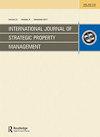The Interplay between Human Resource Strategies and Strategic Alignment: A Comprehensive Review of Conceptual and Empirical Literature in the United States
IF 2
4区 管理学
Q3 MANAGEMENT
International Journal of Strategic Property Management
Pub Date : 2023-07-10
DOI:10.53819/81018102t4170
引用次数: 0
Abstract
Strategic formulation involves senior managers evaluating the interaction between strategic factors and making strategic choices that guide managers to meet the organization’s goals. Some strategies are formulated at the corporate, business and specific functional levels. The term ‘strategic choice’ raises the question of who makes decisions and why they are made. The notion of strategic choice also draws attention to strategic management as a ‘political process’ whereby decisions and actions on issues are taken by a ‘power-dominant’ group of managers within the organization. Strategy implementation is an area of activity that focuses on the techniques used by managers to implement their strategies. Strategic human resource management involves a future-oriented process of developing and implementing HR programs that address and solve business problems and directly contribute to major long-term business objectives. HR management was once largely an administrative function focused on day-to-day responsibilities such as employee recruiting and selection and managing employee benefits. Changes in United States’ overall alignment policy – both the recalibration of its US-alliance relationship and its diversified strategic partnerships – cannot be separated from the larger question of foreign and security policy adaptation which has occurred since the end of the Cold War Keywords: Human, Resource, Strategic, Strategies, Realization, Fit人力资源战略与战略结盟之间的相互作用:美国概念与实证文献综述
战略制定涉及高级管理人员评估战略因素之间的相互作用,并做出战略选择,指导管理人员实现组织的目标。在公司、业务和特定职能层面制定了一些策略。“战略选择”一词提出了谁做出决策以及为什么做出决策的问题。战略选择的概念也引起了人们对战略管理作为一个“政治过程”的关注,在这个过程中,对问题的决策和行动是由组织内的一群“权力主导”的管理者采取的。战略实施是一个侧重于管理人员实施其战略所使用的技术的活动领域。战略人力资源管理涉及一个面向未来的过程,即开发和实施人力资源计划,以解决业务问题,并直接促进主要的长期业务目标。人力资源管理曾经在很大程度上是一种行政职能,侧重于日常职责,如员工招聘和选择以及管理员工福利。美国整体结盟政策的变化——无论是对美同盟关系的重新调整,还是对多元化战略伙伴关系的重新调整——都离不开冷战结束以来发生的外交和安全政策调整这一更大的问题
本文章由计算机程序翻译,如有差异,请以英文原文为准。
求助全文
约1分钟内获得全文
求助全文
来源期刊
CiteScore
4.00
自引率
18.50%
发文量
23
审稿时长
15 weeks
期刊介绍:
International Journal of Strategic Property Management is a peer-reviewed, interdisciplinary journal which publishes original research papers. The journal provides a forum for discussion and debate relating to all areas of strategic property management. Topics include, but are not limited to, the following: asset management, facilities management, property policy, budgeting and financial controls, enhancing residential property value, marketing and leasing, risk management, real estate valuation and investment, innovations in residential management, housing finance, sustainability and housing development, applications, etc.

 求助内容:
求助内容: 应助结果提醒方式:
应助结果提醒方式:


